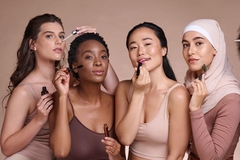US cosmetics companies failing on FDA compliance as industry eyes Trump nominations

Regulatory compliance firm Registrar Corp has found that half (48%) of the companies selling imported cosmetics at America’s top 25 retailers are non-compliant with the US FDA’s cosmetics regulations. The personal care industry is anticipating how incoming US health department appointees under the new Trump presidency might address this potential threat to consumer safety.
Personal Care Insights speaks to David Lennarz, president of Registrar Corp, about how the US government should combat cosmetics that are not compliant with national safety measures.
“[The US government] should put in place the requirement for cosmetic facility registration and listing numbers to be entered into US Customs software at time of entry of products into our ports of entry. This exists for other US FDA-regulated products but does not currently exist in the software that US Customs requires filers to use for imports arriving in the country,” says Lennarz.

Registrar Corp analyzed beauty items sold in grocery stores, pharmacy chains, department stores, and general merchandise chains. The non-compliant cosmetics amounted to approximately 135,000 products.
The US Congress passed the Modernization of Cosmetics Regulation Act (MoCRA) in 2022, which requires the FDA to regulate cosmetics products such as makeup, fragrance, skin care, creams, shampoos, and conditioners.
According to Registrar Corp, in 2023, the FDA received over 5,000 health-related complaints from cosmetics consumers. These include severe allergic reactions, skin burns, and permanent disfigurement. Industry experts believe the actual number of health-related incidents is higher and not reported to the FDA.
Call for safety
Pharmacy chains had the highest supplier compliance rate at 54%, followed by grocery chains with 41%. The latter two were department stores with a 38% supplier compliance rate and general merchandise chains with 32%
 Registrar Corp's president says consumers would be surprised to find the cosmetics they buy at retailers are not compliant under MoCRA. These retailers are not directly responsible for complying with the MoCRA regulations, but their customers expect products on retailer shelves to be safe and compliant with FDA regulations.
Registrar Corp's president says consumers would be surprised to find the cosmetics they buy at retailers are not compliant under MoCRA. These retailers are not directly responsible for complying with the MoCRA regulations, but their customers expect products on retailer shelves to be safe and compliant with FDA regulations.
Lennarz says he is confident that consumers are not aware of this widespread non-compliance.
“I suspect most consumers would be quite surprised to learn that while cosmetic products are now regulated more strictly by the FDA, many manufacturers and brand owners are not yet in compliance.”
Some of the retailers have reportedly notified their cosmetic suppliers that they expect them to comply.
The president of Registrar Corp urges the new Trump administration to provide the FDA with the resources necessary to enforce the provisions of MoCRA but questions if this will happen.
FDA ins and outs
Sara Brenner, an FDA official within the agency’s medical device division, has been named the FDA’s acting commissioner until a permanent body is introduced. Brenner was a senior policy advisor at the White House Office of Science and Technology Policy during the first Trump administration.
Lennarz is unsure how this Trump administration will address non-compliant cosmetics being sold in the US: “Until we are certain as to whom the Commissioner of FDA will be, it’s unclear what the agency’s priorities will be.”
US president Donald Trump has nominated Johns Hopkins surgeon Martin “Marty” Makary to run the FDA, but the Senate has not yet confirmed him. Makary has been a critic of the agency he may lead, vocalizing opposition to mask, lockdown, and vaccine guidance during the COVID-19 pandemic.
Trump has also selected Robert F. Kennedy Jr. to run the Department of Health and Human Services — a role that oversees the FDA. Kennedy’s confirmation hearings are scheduled for this Wednesday and Thursday.
The independent politician has previously accused the FDA of corruption and suppressing the availability of botanicals and other dietary supplements.
Kennedy posted on the social media platform X: “FDA’s war on public health is about to end. This includes its aggressive suppression of psychedelics, peptides, stem cells, raw milk, hyperbaric therapies, chelating compounds, ivermectin, hydroxychloroquine, vitamins, clean foods, sunshine, exercise, nutraceuticals and anything else that advances human health and can’t be patented by Pharma. If you work for the FDA and are part of this corrupt system, I have two messages for you: 1. Preserve your records, and 2. Pack your bags.”
Pieter Cohen, a Harvard Medical School professo Some US consumers have reported permanent disfigurement from cosmetics. r and internist at the Cambridge Health Alliance, told Science, a peer-reviewed academic journal, that the FDA’s suppression of supplements is “a completely false narrative.”
Some US consumers have reported permanent disfigurement from cosmetics. r and internist at the Cambridge Health Alliance, told Science, a peer-reviewed academic journal, that the FDA’s suppression of supplements is “a completely false narrative.”
Cohen has worked to expose the dangers of unregulated supplements and finds that the agency struggles to remove harmful products from the market. Registrar Corp’s latest research echoes these concerns within the cosmetics industry.
“Our analysis indicates that retailers are struggling to ensure the cosmetic products on their shelves are in fact FDA compliant,” says Lennarz.
In his parting comments to staff, Robert Califf, the former US Commissioner of Food and Drugs, warned that “misinformation is precipitating a major public health crisis.” In a recent interview with Stat, Califf said there are “a lot of reasons to be concerned” with the incoming personnel.
However, Stat also spoke to figures in biotech, pharma, and medical devices on their opinions on the administration. Jerome Adams, former surgeon general, called Makary a “reasonable pick” and “perhaps the least surprising or controversial of all of Trump’s health picks so far.”
Last Tuesday, agencies inside the new government revealed they were ordered to conduct a communications pause in the Department of Health and Human Services, which oversees the drug agency.













